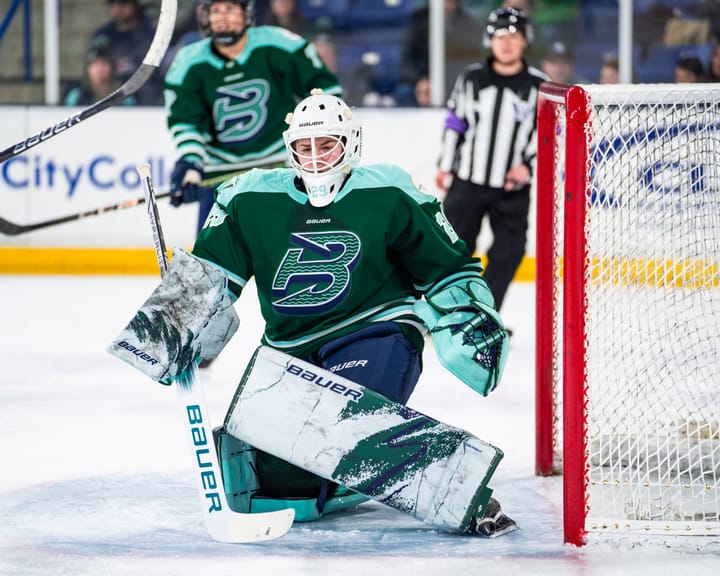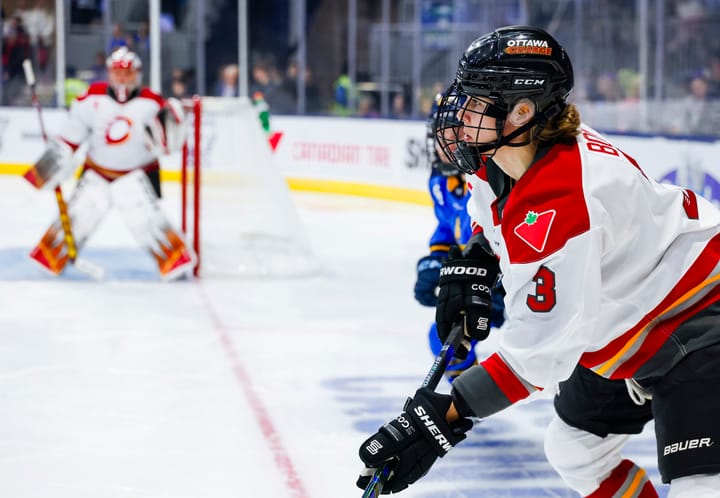The NWHL and the NHL: what can women’s hockey gain — and lose?
While recent partnerships with NHL teams have a lot of promise, there’s a downside to involving men’s hockey with women’s hockey’s interests.
Chapter Three of the National Women’s Hockey League saga involves what some might consider a plot twist: slowly but surely, the NHL is getting its feet wet in terms of partnerships with the Founding Four teams. In half an NWHL season, we’ve seen the New Jersey Devils take the newly-branded “Metropolitan” Riveters under their wing and the acquisition of the Buffalo Beauts by NHL (and NFL) owners - Terry and Kim Pegula. Other partnerships involve the Pittsburgh Penguins and, most recently for the All-Star Game, the Minnesota Wild.
We want to see the 7️⃣1️⃣6️⃣ out in full force at @HARBORCTR on Saturday as we make our #OneBuffalo debut! Puck drops at 1:30pm. #DefendTheCrown
— Buffalo Beauts (@BuffaloBeauts) January 4, 2018
🎟: https://t.co/wf6LC7u6VJ pic.twitter.com/UPJpWVQEnq
Of course, some people might have seen this coming for a while. In fact, they’ve been calling for the NHL to come “save” women’s hockey, even as they talk out of the other side of their mouths about concussion issues, expansion teams and the looming possibility of yet another lockout within the next two to three years. It’s an interesting phenomenon -- the idea that a men’s hockey league that can barely figure out how many millions of dollars to give to its players or its owners can swoop in and effortlessly keep a women’s hockey league afloat.
It’s obviously more complicated than that, and I’m not saying a men’s league can’t do it. The NBA still has the WNBA operating after over 20 years. But that was also a league of their design, approved by their board of governors. Where does the NHL fit into a league that started on its own, with its own vision and mission?
There are benefits to having a deal with an NHL team, or even an NHL owner. The biggest benefit of all? The resources. A typical NHL organization will have millions of dollars in revenue, top-notch marketing, and PR flack at its disposal, making it a lot easier for a fledgling league like the NWHL to get what it needs. Moreover, as is the case with most of the teams in the NW, an NHL team can offer its practice rink for games. Guaranteed ice time, as well as access to training facilities, can mean a lot of money saved up in the long run and more sustainable access to fans (as opposed to trying to find ice time wherever you can get it).
Linking up with an NHL team can also mean more involved marketing strategies. Women’s hockey leagues have (as mentioned before) limited resources, which means smaller staff. They usually rely on volunteers or interns to help figure out how best to reach out to the public. With access to NHL-level marketing teams comes access to professionals who can get you visibility that much more effectively.
Here's everything you need to know about the #NJDevils partnership with the Metropolitan @Riveters! https://t.co/4JnEqOSAu0
— New Jersey Devils (@NJDevils) October 21, 2017
This was the aim of multiple Canadian Women’s League teams when they partnered with the Canadiens, Maple Leafs and Flames a couple of seasons back -- a move that has improved things somewhat. Les Canadiennes de Montreal, for example, have played a regular-season game inside the Bell Centre (their NHL counterparts’ home arena) for two consecutive years now, with the Canadiens hosting it as a double-header with a game of their own and selling tickets on their website. The Maple Leafs have also hosted multiple CWHL All-Star Games at the Air Canada Centre. It can be a good move, providing families with new options for entertainment they might not have had access to otherwise and thus growing a fanbase.
But there comes a downside to aligning with a men’s hockey league. For instance, we can look at the Riveters and Les Canadiennes as examples of a team having to rebrand completely -- the Riveters ditching their red-white-and-blue ensemble for the Devils’ red, black and white, and Les Canadiennes shedding their former “Stars” moniker to become the female version of Les Habs.
Where does a women’s team -- and by extension, a league -- draw the line as far as creating an identity of its own? Does it always have to present itself as the “female” extension of what we’ve considered to be the default?
It feeds into a bigger idea of the NHL having to be the one that “saves” women’s hockey, an idea that doesn’t sit particularly well with me. It’s true that an established league can help lay the groundwork for a fledgling one, and at over 100, the NHL is at this point well-established. And, as mentioned before, the resources they provide can be a tremendous help when it comes to boosting the profile of the NW and the CW. But with every mention of the NHL helping grow the women’s game comes this faint air of paternalism, an air that nonetheless permeates and limits my own willingness to fully embrace what’s been happening this season with the NW (and in past seasons with the CW).
It seems like every women’s team that partners with a men’s one is being treated like a charity case, rather than a full entity in and of itself. They don’t know how to handle themselves, we need to step in and help them, is what everyone seems to be saying without words.
Of course, in saying this we have to acknowledge the fact that women’s leagues are willingly approaching, reaching out, and asking for this help. It’s a two-way street -- and the NW and CW are taking it as a means to ensure long-term viability. It’s an understandable move. I just can’t help but wonder if there’s a different way to approach this, one that doesn’t feel like begging for charity.
As a women’s hockey fan and reporter, I want to see these leagues succeed. And I think the NHL can be a part of that process. But I want them to do that without taking center stage or acting like white knights. Is that possible? We’ll see.





Comments ()